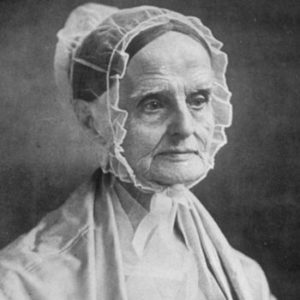
Lucritia C. Mott
Lucretia Coffin Mott was born on this date in 1793. She was a white-American abolitionist and educator.
Lucretia Coffin was born in the seaport town of Nantucket, Massachusetts, and at the age of 13, she was sent to a coeducational Quaker school, Nine Partners, in Duchess County, New York. It was here that Lucretia met James Mott. From 1808-10, she served as an assistant teacher at Nine Partners, and during that time, the Coffin family moved from Boston to Philadelphia.
In 1811, James Mott and Lucretia Coffin married. He engaged in the cotton and wool trade (he later focused only on wool trading as a protest against the slavery-dependent cotton industry in the South). Between 1812 and 1828, Mott had six children, of whom five lived to adulthood. She began to speak at Quaker meetings in 1818, and in 1821, she was recognized as a minister in the Society of Friends in Philadelphia. Throughout their long marriage, James Mott supported his wife in her many activities outside the home.
The Quaker tradition enabled women to take public positions on various social problems. In the 1830s, Mott was elected as a clerk of the Philadelphia Women's Yearly Meeting. During the 1820s, a rift formed between the stricter, more conservative Quakers and the tolerant, less orthodox followers of Elias Hicks (known as the Hicksites). In 1827, first James and then Lucretia followed the Hicksite branch that adopted a free interpretation of the Bible and reliance on inward, as opposed to historical Christian guidance.
Later in her life, she often spoke in Unitarian churches; her sermons show her full engagement in the liberal religious discussions of the day. Mott's letters reflect her travels in the mid-nineteenth century throughout the East and Midwest as she addressed the Non-Resistance Society, the Anti-Slavery Convention of American Women, and the quarterly and yearly Quaker meetings.
Throughout the 1850s, Mott continued her speaking and engaged in further antislavery and non-resistant activities. She worked with other antislavery leaders such as Frederick Douglass, William Lloyd Garrison, and Lucy Stone. As a Quaker preaching non-violence, Mott denounced the Civil War but not without some conflict, for, like other antislavery activists, she hoped the war would end slavery. She died in 1880.
The Encyclopedia Britannica, Fifteenth Edition.
Copyright 1996 Encyclopedia Britannica Inc.
ISBN 0-85229-633-0